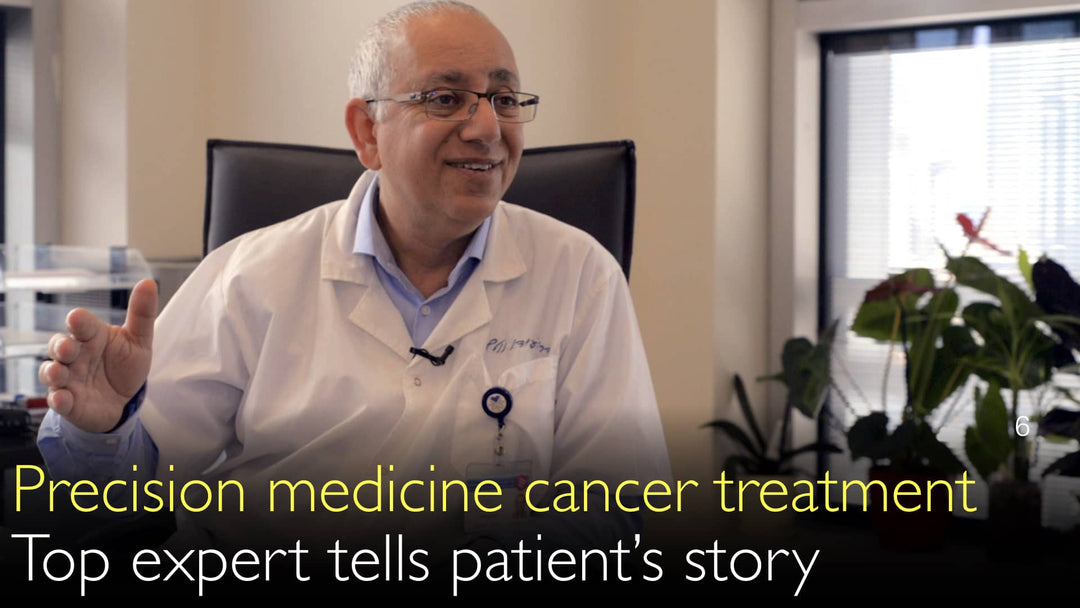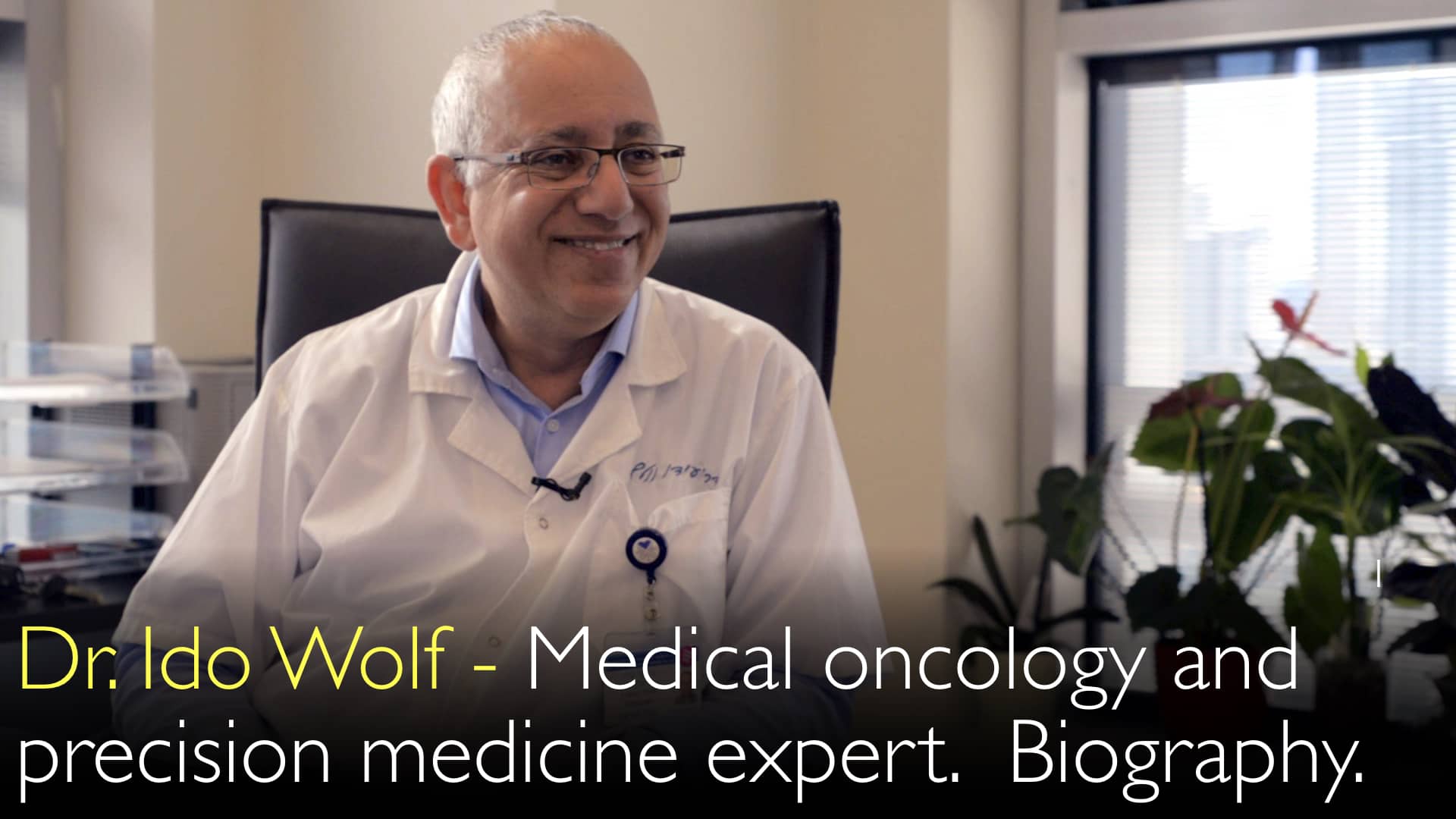Dr. Ido Wolf, MD, en førende ekspert inden for præcisionsmedicin og onkologi, forklarer, hvordan behandlingen af metastatisk skjoldbruskkirtelkræft udvikler sig. Han gennemgår en klinisk kasus med en patient, der oplevede tilbagefald. Genomisk tumorsekventering afslørede specifikke nye mutationer ved hver progression, hvilket muliggjorde en succesfuld sekventiel anvendelse af forskellige målrettede kræftbehandlinger. Dr. Wolf understreger, at kræft ikke er en statisk sygdom, men tilpasser sig og udvikler sig. Præcisionsmedicin giver læger mulighed for at målrette mod disse evolutionære forandringer.
Præcisionsmedicin i udviklende thyroideacancer: Målrettet behandling af sekventielle mutationer
Spring til afsnit
- Præcisionsmedicin i thyroideacancer
- Klinisk tilfælde af vellykket behandling
- Rollen af genomisk tumorsekventiering
- Cancerudvikling og behandlingstilpasning
- Betydningen af gentagne biopsier
- Fremtiden for onkologisk behandling
- Fuld transskription
Præcisionsmedicin i thyroideacancer
Præcisionsmedicin revolutionerer behandlingen af metastatisk thyroideacancer. Dr. Ido Wolf, en førende onkolog, fremhæver vigtigheden af en grundig molekylær profilering. Denne tilgang går ud over almindelig patologi for at forstå de specifikke genetiske drivkræfter bag patientens kræft. Målet er at identificere specifikke mutationer, der kan målrettes med nyere kræftmedicin. Dette markerer et stort skift fra traditionelle, ensartede kemoterapiregimer.
Klinisk tilfælde af vellykket behandling
Dr. Ido Wolf deler et sigende klinisk eksempel, der viser præcisionsmedicins potentiale. En patient med metastatisk thyroideacancer gennemgik omfattende genomisk testning. Den første test afslørede en specifik, behandlingsbar mutation. Patienten blev inkluderet i en klinisk forsøgsordning med en målrettet terapi mod netop denne mutation. Denne skræddersyede behandling gav tre års effektiv sygdomskontrol og fremragende livskvalitet.
Dr. Anton Titov diskuterer tilfældet yderligere med Dr. Wolf. Da kræften til sidst progresserede, blev der foretaget en ny biopsi. Den anden genomiske sekventiering viste, at en ny, forskellig mutation var opstået. En anden målrettet medicin blev givet baseret på denne nye genetiske information. Patienten levede i endnu en længere periode, hvilket viser styrken ved sekventiel målrettet behandling.
Rollen af genomisk tumorsekventiering
Genomisk tumorsekventiering er fundamentet i moderne præcisionsmedicin. Dr. Ido Wolf understreger, at disse test kan afsløre molekylære mål, der ellers er umulige at forudsige. Teknologien muliggør en "laboratorie-til-sengegang"-tilgang, hvor komplekse genetiske data direkte omsættes til konkrete behandlingsplaner. Denne indsigt er afgørende for at vælge de mest effektive målrettede terapier.
Cancerudvikling og behandlingstilpasning
Kræft er en dynamisk sygdom, der tilpasser sig og udvikler sig under behandling. Dr. Ido Wolf forklarer, at den tumor, en patient har ved diagnosen, ikke er uforanderlig. Den ændrer sig over tid, en proces kendt som molekylær escape. Behandlingen kan selektivt favorisere resistente kræftceller, hvilket fører til nye mutationer. Denne udvikling er en central udfordring i onkologi, som præcisionsmedicin direkte adresserer.
Dr. Ido Wolf bemærker, at kræft ændrer sig på tre måder: over tid, afhængigt af lokalisation og som følge af behandling. En metastase i leveren eller hjernen har ofte en anden mutationsprofil end den primære tumor. I brystkræft kan mutationer i østrogenreceptoren fx opstå efter indledende behandling. Flere faktorer driver denne konstante tumorudvikling, hvilket kræver en dynamisk behandlingsstrategi.
Betydningen af gentagne biopsier
Gentagne biopsier gennem forløbet er afgørende for en adaptiv behandling. Dr. Ido Wolf understreger, at beslutninger ikke kan baseres udelukkende på den indledende tumoranalyse. Biopsier ved progression giver læger mulighed for at studere kræftens biologiske og mutationelle udvikling. Denne praksis er nødvendig for at guide den næste behandlingslinje og muliggør en realtids tilpasning til tumorens ændringer.
Fremtiden for onkologisk behandling
Fremtiden for onkologi ligger i at anerkende kræftens udviklende natur. Dr. Ido Wolf beskriver en proaktiv tilgang med kontinuerlig overvågning og intervention. Dette paradigmeskift betyder at behandle kræft som et bevægeligt mål snarere end en statisk tilstand. Præcisionsmedicin giver værktøjerne til at sekvensere behandlinger mod sekventielle mutationer. Strategien åbner for at gøre avancerede kræftformer til kroniske, håndterbare sygdomme.
Dr. Anton Titov og Dr. Ido Wolf er enige om, at dette er den nye udfordring og mulighed i kræftbehandling. Evnen til at udføre genomisk profilering og tilpasse behandlingen er nu en klinisk realitet. Denne tilgang maksimerer patientens livskvalitet og forlænger overlevelsen ved at bruge den rigtige medicin på det rigtige tidspunkt. Den repræsenterer toppen af personlig, patientcentreret kræftbehandling.
Fuld transskription
Dr. Anton Titov, MD: Vi har talt meget om nye metoder til kræftbehandling. Er der et klinisk tilfælde, du kan tænke på—en bestemt patient måske? Et tilfælde, der illustrerer, hvordan den nye præcisionsmedicin og fremskridt inden for onkologi hjælper virkelige mennesker i verden i dag?
Dr. Ido Wolf, MD: Selvfølgelig! Vi forsøger at se ikke blot på den simple patologi. Især for patienter med metastatisk sygdom forsøger vi at foretage en grundig molekylær profilering af tumoren. I nogle tilfælde ser vi molekylære mål, som vi ikke kunne forudsige før vi udførte denne specifikke genetiske test.
Vi kan prøve nye kræftmediciner. Nogle gange ser vi vidunderlige resultater, vidunderlige succeser.
For eksempel havde vi en patient med metastatisk thyroideacancer. Vi fandt den specifikke mutation, så vi inkluderede hende i en klinisk forsøgsordning med kræftterapier rettet mod netop denne mutation. Den kræftterapi virkede i omkring tre år. Det var fantastisk, og hun havde en vidunderlig livskvalitet i den periode.
Men så progresserede hendes thyroideacancer. Vi tog en anden biopsi, og vi fandt en ny mutation. Vi gav patienten en anden medicin, og hun levede igen i en yderligere periode.
Dette er, hvad vi forsøger at gøre nu. Vi forsøger at tage "laboratorie-til-sengegang"-tilgangen. Det betyder at forsøge at se på tumorer ikke blot i begyndelsen, ved kræftdiagnosen. Men vi tager også biopsier gennem hele kræftforløbet.
Vi ønsker at se, hvad der sker med tumoren. Vi ønsker at se, om tumorer ændrer sig. Vi ønsker at se på kræftens biologiske og mutationelle landskab. Vi ønsker at se, hvordan det kan hjælpe os med at guide patienternes kræftbehandlinger.
Dr. Anton Titov, MD: Med andre ord, i netop denne patient med thyroideacancer, adresserede du tumorens molekylære escape mindst to gange. Fordi de kræftfremkaldende mutationer udviklede sig. På grund af kræftbehandling og tumorudvikling i metastatisk sygdom var mutationerne ved kræftrecidiv forskellige. Du var i stand til at bruge forskellige mediciner, der målrettede disse kræftmutationer sekventielt.
Dr. Ido Wolf, MD: Præcis, fordi tumoren udvikler sig. Vi kan ikke træffe beslutninger om tumorer udelukkende baseret på den første tumoranalyse, vi så, da en patient kom til os. Tumoren udvikler sig, og vi må lære og studere denne udvikling. Vi må forsøge at målrette tumoren undervejs, efterhånden som den udvikler sig.
Kræft er ikke en fast sygdom. Kræft er klart den slags sygdom, der tilpasser sig og udvikler sig. Det er udfordringen ved at behandle kræft.
Dr. Anton Titov, MD: Dette er noget, du kan gøre nu med præcisionsmedicin.
Dr. Ido Wolf, MD: Præcis! Kræften udvikler sig; tumoren ændrer sig med tiden. Den tumor, patienten har i dag, er forskellig fra den tumor, han vil have om et år.
Kræft ændrer sig med lokalisation, ligesom vi diskuterede med metastaserne. Vi ved, at tumoren i metastaserne i leveren eller hjernen er forskellig fra den primære tumor.
Kræft ændrer sig med behandling. For eksempel optræder mutationer i østrogenreceptoren efter brystkræftbehandling. Vi har flere faktorer, der driver tumorudviklingen.





